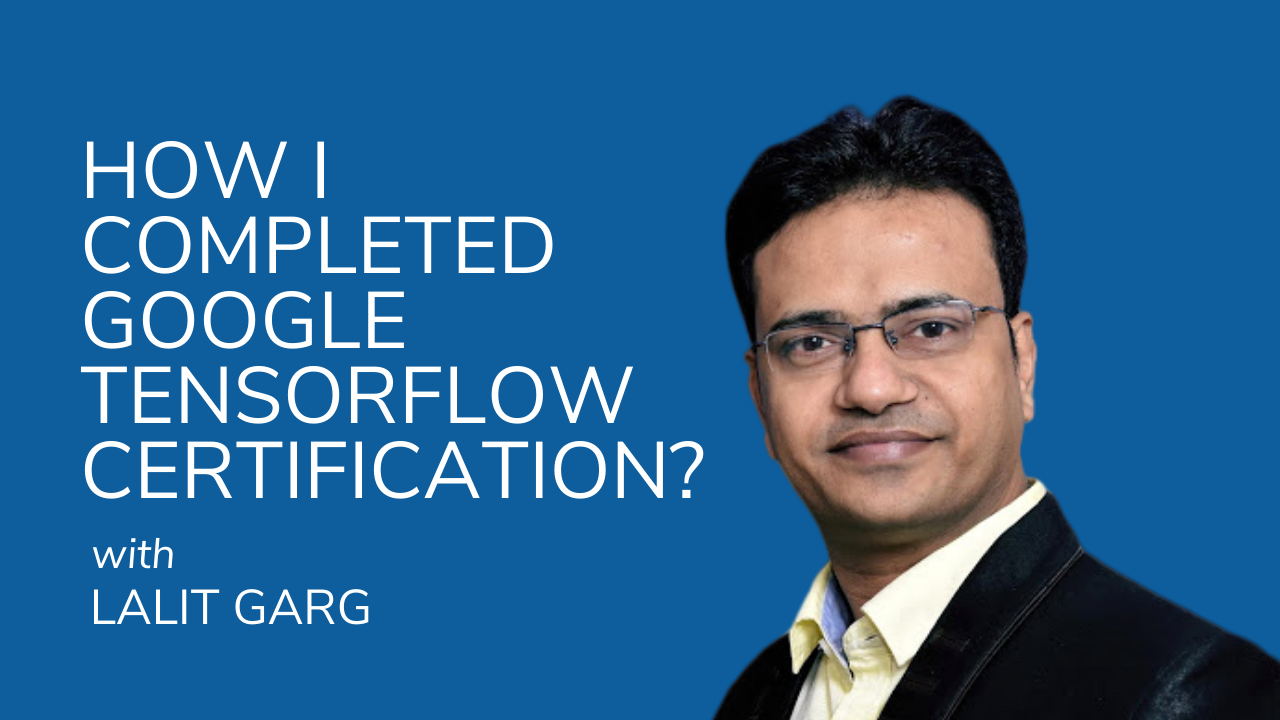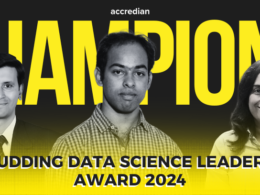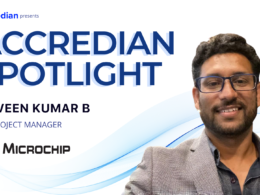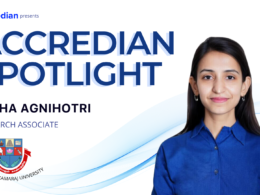Accredian is proud to mentor students who demonstrate distinctive & outstanding qualities, developing them into passionate Data Leaders. We’re an integral part of their learning journey and help them overcome hurdles and celebrate achievements. After all, we have to guide them to reach the pinnacle of their career.
Today, we bring to you a conversation with one of our students, Lalit Garg, who is enrolled in our flagship program – Global Certificate of Data Science. Let us hear about his journey in various Data Science & ML certifications especially given his non-programming background.

Malvika: Could you briefly walk me through your professional achievements?
Lalit: I pursued my graduation in Mechanical Engineering and since then I have worked in several industries including Manufacturing, Construction, Finance and Apparels.
My Techno-commercial profile enabled me to handle different kinds of problem-solving for different industry verticals. I have a strong understanding of business domains for different business processes and IT products like ERP. I’ve end to end knowledge right from consulting, designing, development, implementation and monitoring.
Malvika: You recently achieved another milestone, you’re now a Google Certified Tensorflow Developer. How did you go about pursuing this goal and what other goals have you set for yourself?
Lalit: I actually started with a course in Machine Learning from Stanford university by Andrew NG at first level in Feb 2019 but that was on octave/matlab platform.
Then I earned a specialization in Deep Learning – another course where neural networks and their applications were the main focus. I finished that specialization around 28th Mar 2020.
Tensorflow is a widely used and accepted framework among Data Science and deep learning practitioners and has been open sourced now by Google in 2015-16.
Tensorflow is a readymade framework for Deep Learning model prototyping where a simple model with few layers and neurons along with activation and loss function and optimizers can be quickly implemented in just a few lines of codes.
Around 14th March 2020, Google announced a Tensorflow certification. At the time, I had just finished my Deep Learning specialization from basics where we needed to write code from scratch for feedforward and backpropagation algorithms.
So I started learning Tensorflow and its eager execution and graph based computing framework made it possible for me to implement any Deep Learning problem in merely a few lines of code.
That’s how it all happened. Now, I have my eyes on becoming a Chartered Data Scientist; to earn a Chartered Designation from Association of Data Scientists (ADASCI).
Malvika: How do you think a Tensorflow certification is helpful for your profile and industry?
Lalit: Tensorflow Certification is provided directly by Google and it’s definitely not an easy exam to crack.
You have to have a fundamental knowledge of Deep Learning; on how neural networks actually work and how you can solve regression and classification problems using Tensorflow core APIs.
That said, this is just a basic exam and we can expect Google to release more certifications around Tensorflow in the coming time to test some more advanced skills of people interested in this space.
Deep learning itself is gaining momentum with computer vision and NLP being the main areas of focus. So this certification will definitely help me in building more confidence in myself and feeding motivation to achieve more in this field.
Also, Tensorflow has around 11 TFUG (Tensorflow User Groups) in India and many more across the world and I have been an active participant across TFUG Delhi Group.
Tensorflow documentation is very helpful for developing a deeper understanding. So for the industry as well, Tensorflow is picking up pace and edging towards becoming a leader in this space.
Malvika: How did you prepare yourself for this certification?
Lalit: I started focusing on the content of the exam and Tensorflow in Practice specialization helped me a lot in this aspect.
To understand better about concepts about deep learning, I followed:
Hands On Machine Learning using Scikit Learn and Tensorflow – Revision 2.
This is one of the best books on tensorflow concepts. If I were to talk from an examination perspective, chapters 10 to 16 are a must read.
Also, I completed Specialization Course 1 & 2 in “Tensorflow 2 for Deep Learning” provided by Imperial College of London.
This is also a very powerful course focused on fundamentals. Programming exercises also help a lot. Capstone projects at the end of each course is the best form of self-review.
Then I studied MIT – Introduction To Deep Learning and completed the first three chapters; limiting myself to the examination scope.
Post that, since the exam was on pycharm environment so I learnt pycharm IDE as well. Earlier I was using vscode IDE. Now I am happy that I can use both and publish my code directly to GitHub as well.
Malvika: How do you envision your career as a Data Scientist in the coming years?
Lalit: I am working on something for the Apparels and Garment industry and how Data Science and AI can be used effectively in this sector.
India has been exporting around 16 Billion USD exports for an entire garment industry of 480 Billion dollar. So we are contributing to 3.3% of it.
If you see other countries like Bangladesh, Vietnam, Cambodia and China, These countries are exporting much more because of advancements in the technology and use of AI in their processes.
I would like to build some solutions specific to the Garment sector because this sector needs use of advanced technology to improve further. Some of the cool applications can be improving Buyer – Merchants communication, reducing average response time to quote to buyer based on past data and others.
How 3D design, Virtual Sampling, Digital Materials can reduce approval time from Buyer and reduce the overall delivery cycle for exporters? How supply chains can be effectively managed? how buyer’s demand can be predicted? All of these business problems require the intervention of Technology.
Currently we are implementing WFX (World Fashion Exchange) ERP system in our company and my knowledge of advanced tools in AI space will surely help me to take maximum benefit from the data.
Malvika: Why do you think it’s important for aspiring Data Scientists to continuously upskill themselves?
Lalit: It’s primarily crucial because of three reasons:
- Volume of data is increasing every day. A lot of data is being generated every day in the form of both structured and unstructured data.
- Velocity of data: The speed by which data is being generated and consumed by end users is also huge and we need sophisticated systems to process all such data to gain meaningful insights.
- Variety of data: There’s various kinds of data you encounter & you need to know how to deal with different types of data.
- Value of data: You need to see whether the data being generated is of any value or not.
- Veracity of data: You need to see the source of the data being generated. Is it authentic and true? Can you believe that data to generate relevant insights?
So to deal with all types of data and its challenges, you need to keep updating yourself as a Data Scientist as per the latest developments.
Moreover, this field is growing rapidly on such a large scale that every month innumerable research papers and new algorithms are being created and developed by Professionals, Academicians, Industry stalwarts and research scholars so you can’t risk not updating your skills and becoming obsolete.
Also, this is industry revolution 4.0 and if we will not update our skills, we will surely miss the bus and be left behind for sure.
Malvika: As a non-coder, which challenges did you face interacting with programming in Data Science?
Lalit: As such, I’d say there are no challenges!
The only real challenge is to remove some preconceived notions and prejudices in the mind that I have not done any coding and whether I will be able to do it.
Coding is actually very simple and modern IDE tools, in-context menus and documentation has made it really simple to start writing code and execute it.
We can debug the program also at any point of line of code and inspect more about it if any line of code poses any issues.
Learning to program has been actually fun for me. I started with excel VBA coding even before enrolling for my first ML course so I was confident that I will crack it.
Object Oriented Programming is more about objects and then methods have to work on objects. It’s just how verbs work on nouns! So it’s like the English language. We have to learn the parts of speech of any programming language and we have our bases covered.
Malvika: What is your advice to help non-programmers overcome their inhibitions about a career in Data Science?
Lalit: I would like to share some myths and facts about non-coders’ approach:
- I don’t have any programming background or any relevant exposure (myth)
a). I know Excel and can use the sum/vlookup function, so I can learn programming easily and quickly.
b). I can build my programming skills slowly and gradually and can start from small codes.
- I am too old to learn programming (myth)
a). There is no good time to start. I can start from today itself.
b). KFC business was started at the age of 65 by its founder.
- I have 15 years of experience already, I can hire coders, why do I need to learn it myself? (myth)
a). I will enjoy doing things on my own and building solutions which are futuristic. (Power of AI).
- There is lot of code, how will I remember all the coding? (myth)
a). I can use google search, tensorflow documentation, stackoverflow intelligently once I master the fundamentals. I don’t need to remember anything in coding, rather understanding how coding works.
So there is a solution to every problem. Just leverage the right attitude towards learning something new and you can make it big yourself by following your passion.
Malvika: Do you have any advice for non-programmers to build the right perspective in the field of Data Science & AI?
Lalit: My advice to non-programmers is to take some risks and start with the very basics; building from small to large gradually.
Even if you are not good in coding or programming, there are many other roles which you can play polishing your profile as a data analyst, business analyst and others.
This was our conversation with Lalit Garg. To view is certifications & achievements, you can check out his LinkedIn profile here.






